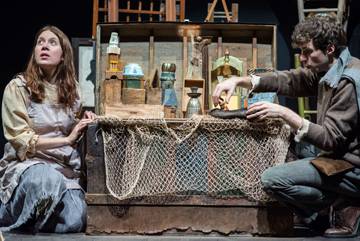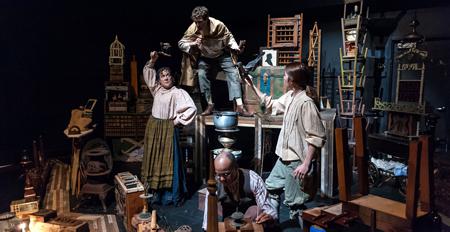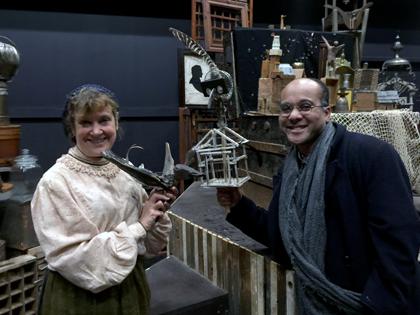Plays
By Gregory Maguire and Oscar Wilde
Directed by Debra Wise
Underground Railway Theater
Central Square Theater
Central Square, Cambridge, MA
November 27, 2015 – January 3, 2016
Scenic and Puppetry Design and Painter: David Fichter
With Eliza Rose Fichter (Swallow, Match Girl), David Keohane (Happy Prince, Frederick), Alan White (Little Match Girl’s Father, Footman), Debra Wise (Frederick’s Mother)

David Keohane as Frederick
in “Matchless and The Happy Prince”
Photo: A. R. Sinclair Photography
Courtesy of Central Square Theater
According to Debra Wise, artistic director of Central Square’s Underground Railway Theater and director of and actor in this production, the theater wanted to do the short play Matchless by Gregory Maguire based on the Hans Christian Andersen tale The Little Match Girl that he had originally written for National Public Radio in 2008. To fill out the program, Wise and company arrived at the Oscar Wilde classic The Happy Prince which, it turns out, has narrative overtones that make it a natural complement to Matchless.
The Happy Prince evokes the story of a prince-like statue whose compassion for those who suffer compels him to convince a sparrow, otherwise interested in flying off to Egypt, to help use the rich adornments of his figure to allay the suffering of those he sees around and below himself: a seamstress and her sick child, an impoverished playwright and, interestingly, a little match girl.
Use of all kinds of ingeniously manipulated gizmos as puppets (notably in the first play, The Happy Prince) culminates with a splayed piece of table support seconding as an angel, a simple but supremely elegant and effective invocation of the image. Any number of other small puppets and props, designed and produced by David Fichter and deftly manipulated by the actors, fill things out eloquently.
Gregory Maguire’s particular genius enables him to begin with a traditional fairy tale and investigate its innards, elaborating upon the original in a way that extends, supports and explains its narrative turns. He has done that extensively with characterological investigations of various evil characters in fairy tales, notably including the Wicked Witch of the West in The Wizard of Oz, to great effect. One comes away from Maguire’s treatments with a much more subtle sense of what constitutes moral choice and direction in these tales, and certainly a deeper sense that what appears as pure malevolence is not innate but based on a complex history and a series of psychological causes.
To similar effect, Maguire, in this play, offers an objective sense of the darker side of life, though not, in this case, as a function of malicious intent. In this tale, loss and death are as much a part of life as are fulfillment and happiness, rendering an existentialist poignancy that provides the depth as well as the sweetness of fantasy.

Alan White, Eliza Rose Fichter
in “Matchless and The Happy Prince”
Photo: A. R. Sinclair Photography
Courtesy of Central Square Theater
The Happy Prince mentions a little match girl and Matchless invokes her presence centrally. The seamstress for the clumsy queen and her son who secretly builds a model city in his attic cross paths with this match girl whose destiny, here as well, invokes such loss as well as a distinctive kind of fulfillment.
Both stories are told with deft economy and with a seamless combination of shared narration by all the actors. The imaginative use of puppets gives way to live action in Matchless, rendering as well a result that is at once sweet, touching and graceful.

on the set of “Matchless and The Happy Prince”
at Central Square Theater
Photo: Charles Munitz
Boston Arts Diary
Gregory Maguire was present for the talk-back after the show and offered, in an engaging and self-effacing way, a sense of his general method for looking into stories such as the one depicted here. Noting that the Hans Christian Anderson story is a very short story with only one spoken line, he described how he would encounter, even in the raw elements of a very short story like this, things “to pull on and investigate.”
Acknowledging the challenge of trying to convey a sense of the core message while honoring the dramatic absences and spaces within Matchless, observing that he’s “actually not good at leaving words out,” he marveled at how the production, through the magic of gesture, so successfully filled those spaces with significance.
In a brief but potent summary of his approach here, Maguire underlined that “it’s a fact that children suffer and die and we shouldn’t forget that in the holiday season.”

Photo: Charles Munitz
Boston Arts Diary
In an interesting autobiographical reflection, Maguire said that he started his career as an artist and illustrator and that somewhat later he became torn between continuing in that vein or becoming a writer. A literal coin flip led to Maguire’s pursuing writing, though he mused about whether he might have flipped the coin again had it not initially turned out that way.
Appreciating the efficacy of bringing together these plays in this simply but beautifully executed production at the Central Square Theater, Maguire said that “these stories wanted to be married, to fall in love with one another,” a lovely testament by this immensely popular author to the conception behind this small dramatic gem in the heart of Cambridge, an hour and a quarter that delivers charming, poignant and dramatic riches.
-BADMan
Leave a Reply